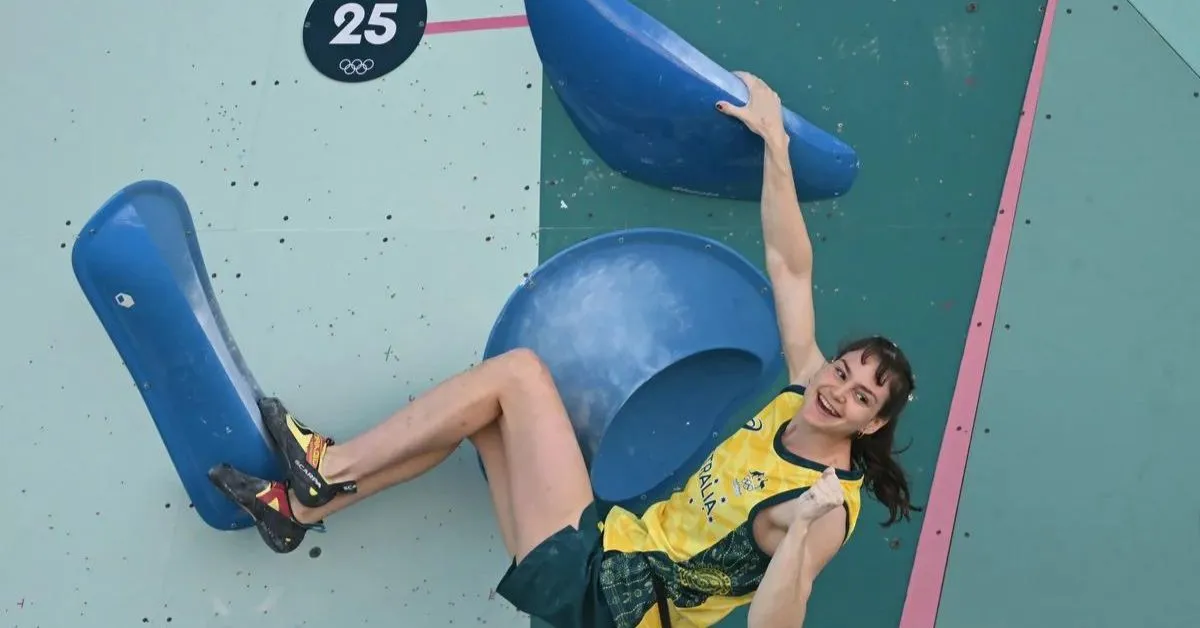Climbing has become a fascinating addition to the Olympic lineup, making its way into the 2024 Paris Olympics. This thrilling sport, which first appeared at the Tokyo 2021 Games, has captured the attention of audiences worldwide.
When Did Climbing Become an Olympic Sport?
Climbing officially made its Olympic debut at the Tokyo Games in 2021. However, its journey began earlier at the Buenos Aires Youth Olympic Games in 2018.
Along with skateboarding and surfing, climbing was introduced as part of a movement to include more urban sports in the Olympics.
The goal was to attract a younger audience and diversify the games’ offerings. The sport’s popularity has since grown, ensuring its place in future events, including the Los Angeles 2028 Summer Olympics.
Climbing’s Evolution in the Olympics
The inclusion of climbing in the Olympics marked a significant shift towards more modern, urban sports. By bringing in activities like skateboarding and surfing, the International Olympic Committee aimed to refresh the games and appeal to a broader, younger audience.
Climbing, with its unique blend of physical prowess and strategic thinking, quickly became a fan favorite and will continue to be a staple in future games.
How Does Olympic Climbing Work?
Olympic climbing is divided into three distinct disciplines: bouldering, lead climbing, and speed climbing. Each discipline tests different aspects of a climber’s skills, making for a comprehensive and exciting competition. Here’s a closer look at each one:
Bouldering
In bouldering, athletes tackle a 4.5-meter wall (about 15 feet) without ropes. The challenge lies in completing as many problems (routes) as possible within a limited time, using the fewest attempts.
The scoring is based on the number of zones reached (with points for low and high zones) and successful completion of the climb, known as a “top.” Climbers aim for a perfect round by flashing all problems, meaning they complete them on the first try.
Lead Climbing
Lead climbing is all about endurance and precision. Climbers attempt to ascend as high as possible on a 15-meter wall (nearly 50 feet) within a six-minute time frame. Unlike bouldering, they use ropes for safety.
The scoring in lead climbing is determined by the number of holds successfully reached. The higher the climber goes, the more points they score. If a climber reaches for a hold but doesn’t secure it, they receive partial points.
Speed Climbing
Speed climbing is a race against the clock. Climbers compete head-to-head on a standardized 15-meter wall with a five-degree incline. The goal is simple: reach the top as quickly as possible.
The top climbers can complete the wall in under six seconds for men and under seven seconds for women. This discipline’s straightforward, high-octane nature makes it a crowd-pleaser.
Changes in the 2024 Games
The 2024 Paris Olympics bring some exciting changes to the climbing events. Unlike the combined format used in Tokyo, where athletes competed in all three disciplines, speed climbing is now a separate event.
This allows specialists to shine in their respective areas. Bouldering and lead climbing remain combined, challenging climbers to excel in both disciplines.
The scoring system has also been updated to better reflect the athletes’ skills and achievements.
Scoring System Breakdown
In the bouldering and lead climbing combined event, the maximum score is 200 points. In bouldering, points are awarded for reaching various zones and the top hold, with deductions for failed attempts. A perfect score in bouldering is 100 points.
In lead climbing, climbers score points for each hold they secure, with partial points for reaching but not securing holds. This new scoring approach aims to provide a fair and exciting competition.
Top Team USA Athletes
Team USA is bringing some top-tier talent to the 2024 Paris Olympics. Sam Watson, a rising star in speed climbing, holds the men’s speed world record with a time of 4.79 seconds.
He finished 2023 ranked eighth in the world and claimed gold at the Pan American Games. Natalia Grossman is another standout, ranking No. 1 in women’s bouldering and fifth in the combined boulder and lead category.
She also won gold in both disciplines at the Pan American Games. Brooke Raboutou, who finished fifth in Tokyo, brings a wealth of experience and heritage, being the daughter of former climbing world cup champions.
International Competitors to Watch
The international competition is fierce. Janja Garnbret of Slovenia, the reigning women’s gold medalist, is a favorite in lead/bouldering. Poland’s Aleksandra Miroslav is a top contender in women’s speed climbing, while Ai Mori from Japan is a force in the boulder/lead category.
In men’s speed, Indonesia’s Rahmad Adi Mulyon and Veddriq Leonardo pose a challenge to Watson. Jakob Shubert from Austria, a four-time world champion, is a strong contender in men’s lead/bouldering.
The Excitement of Olympic Climbing
What makes climbing at the Olympics so thrilling? It’s the blend of athleticism, strategy, and sheer determination.
Watching athletes scale walls at breathtaking speeds or tackle complex boulder problems keeps spectators on the edge of their seats. The unpredictability and high stakes of each climb add to the excitement, making it a must-watch event.
Training and Preparation
Training for Olympic climbing is rigorous and multifaceted. Athletes focus on building strength, endurance, and technical skills.
They also work on mental conditioning, as climbing requires a high level of concentration and problem-solving ability. Preparation involves simulated competitions, intense physical training, and meticulous attention to diet and recovery.
Future of Climbing in the Olympics
As climbing continues to grow in popularity, its future in the Olympics looks bright. The sport’s inclusion has sparked increased interest and participation worldwide.
As the rules and formats evolve, climbing will likely continue to captivate audiences and inspire new generations of athletes. The continued emphasis on urban sports also suggests that climbing will remain a key part of the Olympic program.
